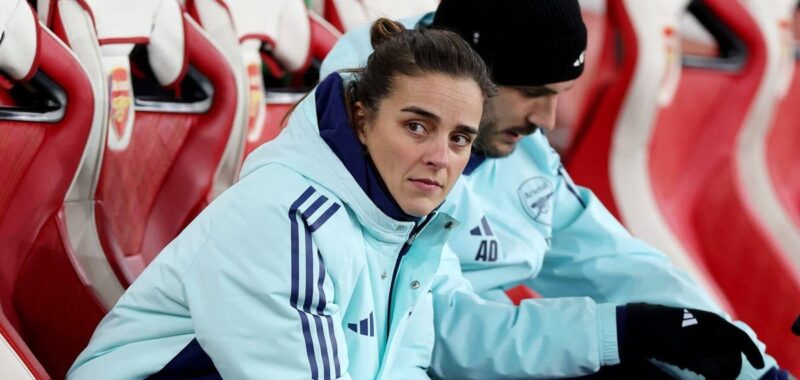Arsenal’s win over Juventus was significant for two important reasons. It secured their place in the Champions League quarter-finals, but maintained the side’s unbeaten record under interim head coach Renee Slegers since she replaced Jonas Eidevall.
Eidevall resigned on October 15 — their record under Slegers reads: played seven, won six and drawn once. They head into the international break with the mood completely changed, Lina Hurtig’s 89th minute goal securing the latest win over the Italians.
“It’s the ultimate end to a very busy and intense block we have had,” Slegers, the former Dutch international said. “It is the perfect ending for this block. It means a lot. All of the players totally deserve it. It gives us some breathing space in the last two (group) games as well.”
Slegers was initially put in interim charge until at least the Juventus match to allow her to focus on the task at hand. Naturally, the team’s much-improved form has brought overwhelming external support for the former Arsenal academy player to fill the vacant head coach role, but the 35-year-old has been hesitant to comment on her future in public. She will now have a few days off visiting family in the Netherlands before returning to Arsenal for talks on Monday to train players who are not going away with their national teams.
Arsenal are confident in her capability as interim head coach and, as a result, do not feel rushed to make a permanent appointment before their first game after the break against Aston Villa on December 8. There is still, however, an external process to decide Eidevall’s permanent successor.
Arsenal will be helped further by the scheduling of their matches after the international break. They play just four matches in December — in 10 days — before the winter break. They then have just two WSL matches in January, with the FA Cup fourth round fixture still to be determined.

Hurtig scores the winner against Juventus (Alex Pantling/Getty Images)
Slegers has made a point of sharing the credit for steadying the ship after the Eidevall’s departure last month.
“We have done really well but I was part of Jonas (Eidevall’s) staff and there was so much that was built during his time,” she said. “I don’t want to separate that. There is so much we are still building on. It’s surreal in so many ways but we are very happy.”
Slegers was a member of Eidevall’s backroom staff at their previous club Rosengard in Sweden, where she took over permanently after he joined Arsenal.
One-to-one conversations with players around their development were a common part of her remit before becoming interim head coach, which helped her and the coaching staff take a collaborative approach with the players after Eidevall’s exit. Before last weekend’s north London derby win, she used players starting to present in team meetings as an example of how that manifests itself.
Against Juventus, she pointed to half-time discussions between staff and players on how to recognise spaces and overloads better after the visitors took a different tactical approach against them compared to the 4-0 Arsenal win in Italy last week.

GO DEEPER
Inside Eidevall’s Arsenal exit: Tension over style, farewell speech and succession planning
This is not the first time Arsenal have benefitted from an interim being uniquely placed before the departure of a head coach.
In 2019, Freddie Ljungberg’s three weeks in interim charge of the men’s side served as an important bridge between Unai Emery and Mikel Arteta. Similar to Slegers, helping players adapt to first team demands was part of his remit. The slight difference was that much of that focus was on Arsenal’s young talent, as he had been their under-23s head coach the season before. This led to Bukayo Saka cementing his place in the team at left-back, as well as Emile Smith Rowe and Gabriel Martinelli playing their first Premier League starts for the club.
That knowledge of the players allowed a natural reset before more wholesale changes were made. For Ljungberg, that provided clarity in his first weeks in the job before he made it clear that a more permanent solution would be needed. While Slegers has not overplayed her card in public, she has not distanced herself too much from the job either.
In her pre-Juventus press conference, she said: “What will happen after the international break, I really don’t have my mind set on that. I’m learning loads, but I haven’t come to that stage yet. I fully trust the club that they’re trying to find the right solution to go forward.”
On whether the clarity of the interim nature of her role in this block of games helped, she added: “It’s definitely helped us, knowing only about the short future because it’s forced us to be in the moment and try to impact things on a short-term basis.”
There is not much more Slegers could have done to impress. Aside from results, there has been more fluidity and freedom in Arsenal’s play since she took the reigns which has remedied some longstanding issues such as the side’s expected goals (xG) under/overperformance but made matches more exciting.
Not only that, but Arsenal can do what seemed unthinkable when they lost 5-2 to Bayern Munich in the opening group game — potentially win the group in what will be a deciding return game on December 18.
Asked to give her time in charge a mark out of 10, her answer was comically diplomatic, but gave an indication of what Arsenal needed in this past month: “We wouldn’t give ourselves a 10/10 but we will give ourselves a big fat ‘enough’,” she said.
(Top photo: Julian Finney/Getty Images)

